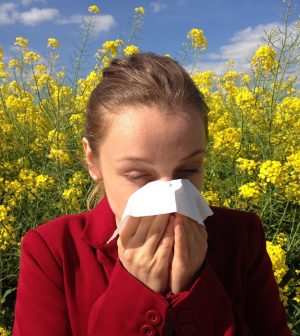- Finding Unshakable Power in a World That Wants to Pull Us ApartPosted 6 months ago
- What could a Donald Trump presidency mean for abortion rights?Posted 6 months ago
- Financial Empowerment: The Game-Changer for Women in Relationships and BeyondPosted 7 months ago
- Mental Health and Wellbeing Tips During and After PregnancyPosted 7 months ago
- Fall Renewal: Step outside your Comfort Zone & Experience Vibrant ChangePosted 7 months ago
- Women Entrepreneurs Need Support SystemsPosted 7 months ago
Your Seasonal Allergies May Be Worse This Year

By Andrea Donsky, RHN | Naturallysavvy.com
Who doesn’t love spring in Toronto? After surviving the frigid winter months, the mounds of snow, icy streets, and too many freezing cold mornings, I can’t wait to throw open the windows and doors and let the fresh spring air in.
However, for many of you, opening up your windows also comes with the reality of seasonal allergies. Although we would all love to embrace the warmer weather of springtime, the arrival of pollen and other allergens can make it more challenging. If this sounds familiar, you are not alone.
According to Dr. David Fischer, an expert in allergic rhinitis and past president of the Canadian Society of Allergy and Clinical Immunology, Canadians have seasonal allergies between 20 and 30 percent. In the United States, the Centers for Disease Control and Prevention reports that 7.7 percent of adults and 7.2 percent of children have seasonal allergies (aka hay fever).
Instead of clutching your mittens and scarf, you now need to be armed with tissues for your sneezing and runny noses. If you are looking for a natural way to ease your itchy eyes and other allergy symptoms, we have a possible solution for you.
I decided to check in with my friend and an expert on the subject of seasonal allergies, Canada’s leading functional-medicine expert Bryce Wylde, BSc, DHMHS. He recently said something very interesting…and a bit disconcerting…about this year’s allergy season.
It seems that the extra sanitary efforts and social distancing we engaged in over the past couple of years may make this year’s allergy season worse than usual. But why?
Read about 10 easy ways to relieve seasonal allergies
He explained that we also shielded ourselves from typical amounts of bacteria and viruses in our efforts to avoid getting sick, creating a perfect storm for seasonal allergens. “When that happens,” he said, “your immune system can become dysregulated. Once you are re-exposed to seasonal allergens, it is possible your immune system will overreact, and your symptoms will be a whole lot worse than usual.”
Bryce’s information left me with more questions for him about seasonal allergies. Fortunately, he shared the following with me:
- Get tested. Skin or blood testing can identify the culprits if you don’t know which substances you are allergic to. This gives you a starting point to knowing which allergens to avoid as much as possible.
- Avoid cross reactivity. Allergy cross-reactivity can occur if you consume foods that have proteins similar to the ones in the things you are allergic to. For example, if you are allergic to tree pollen, you probably have cross-reactivity to almonds, apples, basil, carrots, celery, hazelnuts, oregano, and potatoes.
- Avoid inflammatory agents. Allergic reactions involve inflammation, so it’s wise to keep any other exposure to inflammatory factors to a minimum to help reduce your allergy symptoms. These factors include excessive alcohol, sugar, white flour, smoke, and dairy.
- Choose quercetin. Foods rich in the antioxidant quercetin (e.g., apples, onions, broccoli, black and green teas, cherry tomatoes, kale, blueberries) can help regulate mast cells, which prompt the release of histamines, the culprits behind allergy symptoms. (Note: avoid any foods that may cause cross-reactivity.)
Read about using homeopathics to boost the immune system
- Go homeopathic. The beauty of homeopathic remedies is that they activate the body’s natural defenses and focus on the underlying issue. Similasan Allergy Eye Relief eye drops, for example, is a made with natural medicinal ingredients and no harsh chemicals, decongestants, steroids, dyes, and vasoconstrictors found in conventional eye drop products. Such products can over dry your eyes and cause other side effects. In Toronto, you can purchase Similasan Allergy Eye Relief eye drops at Wal-Mart as well as online at Walmart or Amazon in both Canada and the US. Bryce noted that “the eye drops can be used as often as needed.”
- Replace filters. The air filters in your home, office and car should be replaced frequently. You can buy washable filters, which are eco-friendly and economical in the long run. Use a HEPA (high-efficiency particulate air) filter in your home if possible.
- Clean your nose. Use a neti pot or similar device with saline solution to remove allergens from your nasal passages.
- Wear protection outdoors. The use of a hat and sunglasses can help reduce the amount of pollen, mold, and other allergens that cling to your hair or affect your eyes.
- Don’t bring the outdoors in. To help eliminate outdoor allergens when you enter your home, change your clothes, refresh your pillow and pillowcases in the dryer, and wash your hair.
Bottom line
I hope this information empowers you not to let your allergies take the spring out of your step! Making some or all of these lifestyle changes and considering homeopathic eye drops to relieve your itchy eyes can really make a difference when it comes to your seasonal allergies.
Sources
Centers for Disease Control and Prevention. Allergies and hay fever.
Richard J. Canada’s 2020 pollen report: what to expect this allergy season. Weather Network 2020 Apr 21
Feature Slider Image by Cenczi






